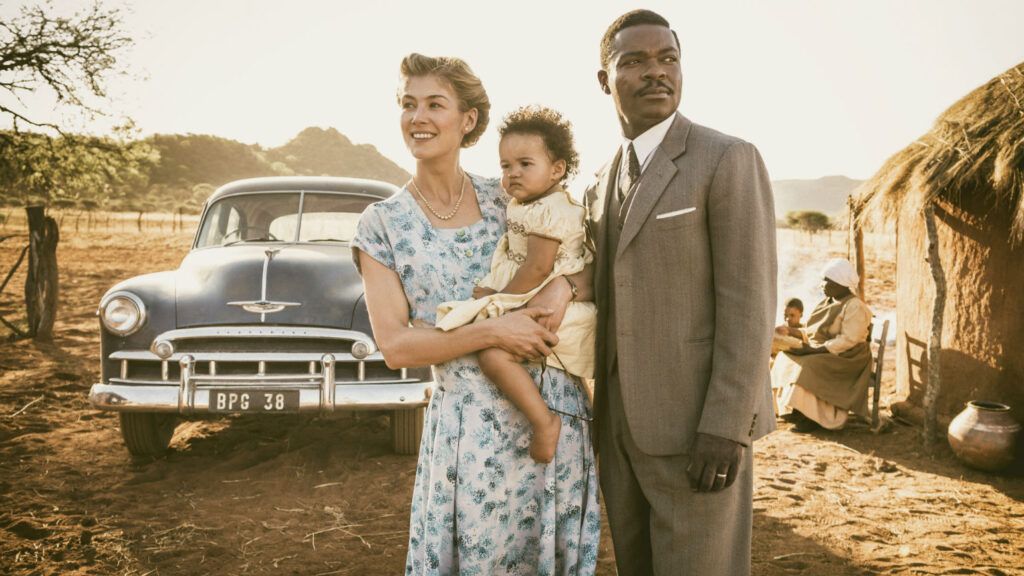A United Kingdom is the epic, new film from director Amma Asante based on the true story of the internationally controversial marriage of Botswana’s Prince Seretse Khama and white Englishwoman, Ruth Williams in the 1940s. Starring Guideposts cover star David Oyelowo as Khama and Rosamund Pike as Williams, the inspiring film shows that love really can conquer all.
“It’s two people fighting to be together and in the process they change the course of history,” Pike tells Guideposts.org. “That’s the power of love, right there in a nutshell. You do something that’s purely personal and it ends up having an impact.”
READ MORE: David Oyelowo On Faith And Family In Hollywood
Though powerful, the story of Khama and Williams is, sadly, one you won’t find in your history books. The inconvenient romance that almost upended the British Empire and resulted in the independence of a now democratic Botswana has been swept under the rug for generations. Thanks to Asante’s film, a new generation will know how these two individuals impacted the world.
Their story begins in the summer of 1947. Khama met Williams at a dance organized by the London Missionary Society. He was a young king-in-the-making, studying in London and planning to return to his home country to rule. She was a clerk dragged to the dance by her sister. They bonded over their love of jazz and soon fell in love but his royal status and their different races meant their romance was often thwarted by the government, their friends and their family and ridiculed by the media.
Williams’s father soon disowned her. Due to the colonization of the African continent by the British and other European nations, Botswanans were skeptical of Europeans and their intentions and therefore refused to accept a white woman as their queen.
The British Empire, which controlled national decisions for Botswana, strongly opposed the marriage on political grounds. The Empire planned to use gold and uranium from neighboring South Africa during a time when that nation was just beginning apartheid, the legal system of oppression against Black South Africans by descendants of white Dutch and other European colonizers. To support the marriage of a white woman and a Black man meant endangering the British alliance with apartheid South Africa, risking Britain’s economy and potentially starting another war.
The British government constantly attempts to strong-arm the couple into separating by threatening Seretse’s right to rule, exiling him and imposing British rule over his country. That edict marks the true beginning of the couple’s resistance to the British despite mounting political pressure and the threat of war.
For star and producer Oyelowo, who first read the couple’s tale nearly ten years ago, bringing the true story of a Black African man fighting for his people and his family to the big screen was a rare opportunity he couldn’t pass up.
“I grew up around Black men who were very self-possessed, who loved their families,” says Oyelowo, who spent his formative years living in Nigeria. “That bearing, that dignity, that’s the kind of man I grew up with. But they’re never talked about [in media].”
“Whenever you talk about an African leader,” he says, “I found it to be negative. Leaders who are corrupt, who are hell bent on being connected to the West, filching from their country, their resources. To happen upon a story with a man who believes in love and is invested in his own community, I wanted to see that because it represents what I know to be true and I had never seen it on film.”
Pike was also intrigued by the opportunity to make a historical film unlike any she’d ever seen.
“Growing up as a little girl, looking for images of love on the big screen, I never had an interracial marriage or love affair as a representation of what love could look like,” Pike admits. “I think it was exciting for me to put that image on the screen.”
The idea that love can cross all divides is something that appealed to Oyelowo as well, particularly during a time of upheaval and unrest in the U.K. and abroad.
READ MORE: Lupita Nyong’o Inspires In ‘Queen Of Katwe’
“A lot of people have said the film is very timely, I think it is but it’s also timeless,” Oyelowo says. “I’m a big believer in the power of love to heal and to obliterate those things that are different about us and make us recognize that we are so much more alike than we are different, across racial lines, gender lines, age lines, religious lines. For me, the film is hopefully a tonic for people right now.”
For the actor, who’s always relied on his faith to inform the roles he takes, telling Seretse’s story on screen meant paying homage to the kind of love he’s built his life on but has rarely seen on film.
“We’re so used to seeing lust on film made to look like love,” Oyelowo says. “I would argue the two things are quite different. In coming across this story, this felt like evidence of love. Not just love in a Hollywood way but sacrificial love – you’re going to put yourself on the line, you’re going to give to another person without the thought of getting back.”
“As a Christian,” he says, “the greatest evidence and example of that in my life has been Jesus Christ in terms of what he did on the cross for me and, I believe, for the world. One of the reasons I was so inspired by these two is because what they did for each other and for Seretse’s country was an act of sacrificial love.”






